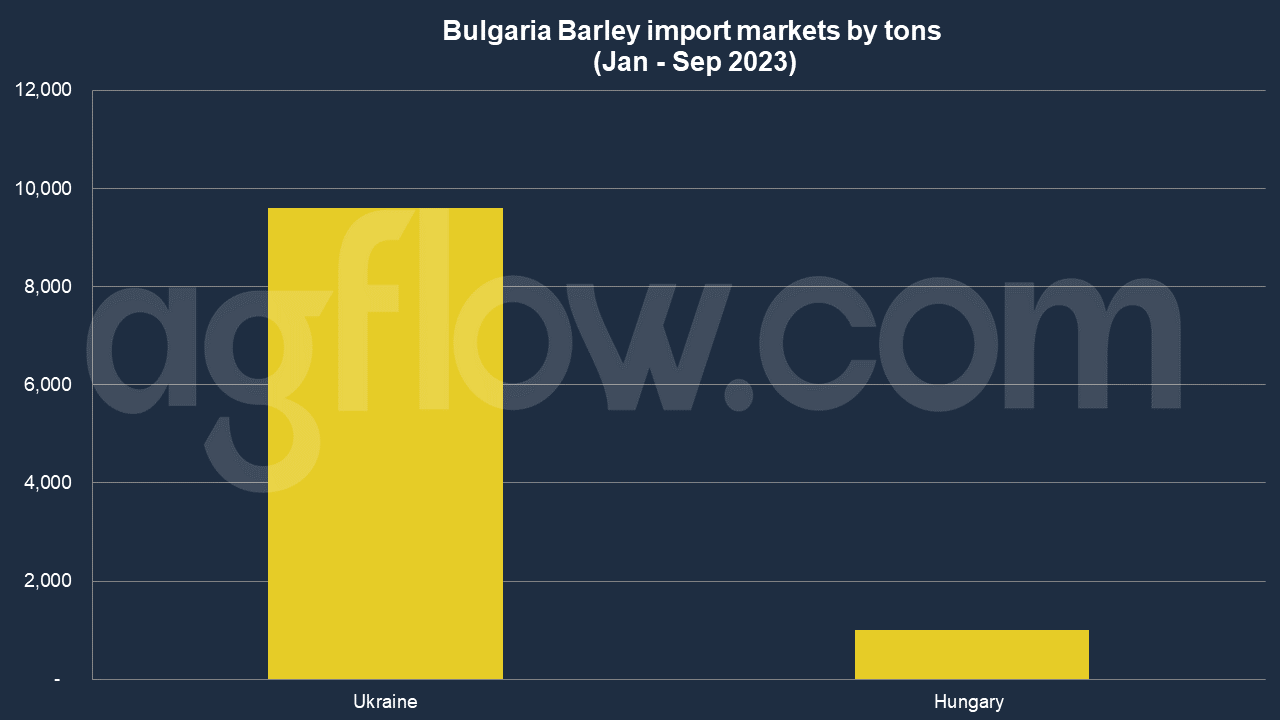Bulgaria Barley Imports: Ukraine Pushes
Talk to our team about AgFlow's offering →
Reading time: 2 minutes
In the realm of global agricultural trade, few commodities present as intriguing a story as barley, and few nations stand out in its narrative, like Bulgaria. But what makes Bulgaria’s barley trade and imports especially captivating in 2023? Let’s embark on a journey to decipher this.
Bulgaria: A Brief Introduction to its Barley Landscape
Bulgaria, nestled in Southeast Europe, boasts a unique climatic blend that facilitates barley cultivation. With its rolling plains and temperate weather, the country has emerged as a critical player in the barley trade. The keyword here is “adaptability.” Bulgaria’s farmers have adapted to the global demands and market volatilities associated with barley. Barley production is mainly in the Danubian Plain, bordering Romania in the northern regions of. Montana, Lovech, Razgrad and Varna.
Trade-offs in Balancing Diverse Factors
Balancing diverse factors in the barley trade is akin to walking a tightrope. On one side, maintaining quality while meeting the ever-growing demand is challenging. On the other, there’s the pressure to ensure environmental sustainability and adhere to international standards.
The first half of 2023 witnessed a rise in global demand for barley. This, in theory, should be a boon for Bulgarian farmers. However, can increased demand be met without compromising quality? And how does Bulgaria ensure that its barley remains competitive globally? Answering these rhetorical questions requires a nuanced understanding of the interplay between demand, quality, and sustainability.
Challenges of Different Approaches
Two major approaches dominate Bulgaria’s barley trade: organic cultivation and genetically modified (GM) crops. Organic barley, though it comes with its set of challenges – like vulnerability to pests – is gaining traction, especially in niche markets valuing natural produce. GM barley, on the other hand, offers higher yields but often faces resistance from certain trade partners due to health and environmental concerns.
Navigating these approaches is like choosing between two different paths that promise the same destination but offer distinct journeys. The metaphorical “fork in the road” represents the tough decisions Bulgarian traders and policymakers face.
The State of Imports: A Dual-edged Sword
While Bulgaria exports a significant volume of barley, it also imports certain variants to cater to its domestic market. The ebb and flow of imports are influenced by several factors, including domestic demand, international pricing, and trade agreements.
In 2023, Bulgaria’s barley imports saw a slight uptick. Was this a reflection of domestic consumption patterns or an indicator of a broader global trend? One could argue both ways. It’s a dance between global dynamics and domestic necessities, making the barley trade in Bulgaria as intricate as it is fascinating.
According to AgFlow data, Bulgaria imported 9,600 tons of Barley from Ukraine in Jan – Sep 2023, followed by Hungary (1,002 tons). In 2021, Bulgaria imported Barley worth $1.08 million, becoming the 86th largest importer of Barley in the world. At the same year, Barley was the 928th most imported product in Bulgaria. Bulgaria imports Barley primarily from: Hungary ($574k), Romania ($216k), France ($106k), Greece ($103k), and Austria ($43.1k).

In Conclusion: Navigating the Barley Trade Waters
Bulgaria’s barley trade and imports in 2023 offer a compelling study in balancing act and adaptation. While the country grapples with the trade-offs of different cultivation techniques, its position in the global barley market remains robust. For professionals in the agricultural commodity industry and casual observers alike, Bulgaria’s barley story is a testament to the intricate weave of global trade, domestic demand, and sustainable practices. Watching Bulgaria navigate these waters promises to be an enriching experience as we move forward.
Try AgFlow Free
Access Free On Updates for Corn, Wheat, Soybean,
Barley, and Sunflower Oil.
No Credit Card Required & Unlimited Access In Time

